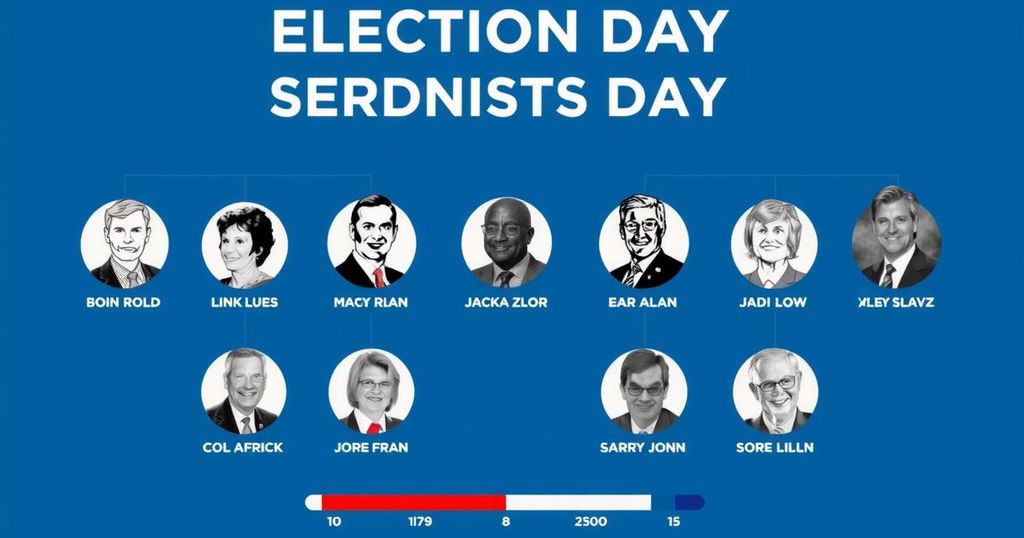World news
2024 PRESIDENTIAL ELECTION, AFRICA, AMERICA, CONGRESS, CUBA, DONALD TRUMP, ELECTION, FLORIDA, GARY JOHNSON, JAMES HOHMANN, JAMES HOHMANN EUGENE ROBINSON, KAREN, MADISON SQUARE GARDEN, NORTH AMERICA, OHIO, PRESIDENTIAL CANDIDATES, PRESIDENTIAL ELECTION 2024, SOUTH AFRICA, U.S. ELECTIONS, US ELECTIONS, UTAH, VIRGINIA
Marcus Chen
0 Comments
Election Day Predictions: Expert Insights on Potential Outcomes and Key Factors
This article delves into the predictions of prominent columnists regarding the upcoming election day, discussing the substantial shifts in swing states, the implications of reproductive rights, and economic considerations influencing voters. It reflects on previous electoral misjudgments and highlights the high tension as election day approaches, emphasizing a cautious skepticism regarding forecasting outcomes amidst prevailing polarization.
As the race to control Congress and the presidency intensifies, various political commentators express their projections regarding the outcome of the upcoming election day. Key swing states and congressional seats are under scrutiny as pundits weigh their chances amidst a highly polarized political environment. James Hohmann, a prominent political analyst, reveals his unease in making predictions, admitting that he had anticipated a Trump victory for months, but acknowledges the unsettling developments leading up to the election. Other columnists like Karen Tumulty reflect on the unpredictability of the electoral landscape, recalling her misguided prediction during the 2016 elections and noting the significant shrinkage of the competitive states from fifteen in 2016 to seven this year. Tumulty emphasizes that the heightened polarization has created a more binary electoral dynamic focused on Trump versus non-Trump candidates. Eugene Robinson adds to this discourse by highlighting the diminished role of third parties in this election cycle, which previously influenced outcomes in key states. Columnists debate the confidence levels regarding their predictions, with Gene indicating a degree of assurance in the potential impact of reproductive rights on voter turnout, while acknowledging the structural challenges Kamala Harris faces, such as President Biden’s low approval ratings and a shift in party alignment that favors Republicans. As for Nevada, there is disagreement among the commentators on its anticipated outcome, given its complicated political landscape. The commentary reveals the competing forces at play, including the influence of labor unions, demographic trends, and local political machines. Additionally, the predictions regarding Senate races in battleground states like Wisconsin indicate an uncertain yet competitive environment. On Texas’ Senate race, skepticism remains about whether the Democrats can secure a victory against Ted Cruz, despite early polling indicating narrowed margins. The experts reflect on the importance of state-level sentiments, particularly regarding abortion rights and economic concerns as pivotal factors potentially swaying voters. Over recent weeks, polling data has shown minimal shifts, underscoring the static nature of the race. Last-minute strategies from candidates, particularly Trump’s rhetoric around election integrity, could have significant ramifications for public sentiment as election day approaches. As the commentators prepare to observe the final countdown to election day, they express a mix of resignation and anticipation, maintaining a guarded outlook regarding their predictions and emphasizing the ever-changing dynamics of the political landscape.
The article highlights the complexities and unpredictability surrounding predictions for an upcoming election day, shedding light on the changing political map and the factors influencing voter behavior. Columnists discuss their assessments of key swing states, the influence of various political issues, and the general unpredictability inherent in the electoral process. Important topics, such as the implications of reproductive rights and economic concerns, are underscored as essential to understanding the election’s dynamics. The text serves to encapsulate expert opinions while also reflecting on past election pitfalls that inform current expectations.
In conclusion, the predictions regarding the election outcome reflect a climate of uncertainty and a shifting political landscape. While various expert commentaries offer insights into key factors and state dynamics, there remains significant variability in voter responses due to entrenched partisan beliefs and pressing social issues. As election day draws near, the pundits express a cautious but keen interest in how these elements will play out in determining control of Congress and the presidency.
Original Source: www.washingtonpost.com




Post Comment